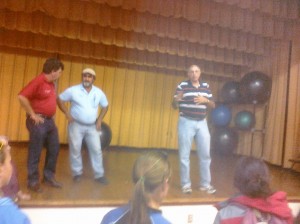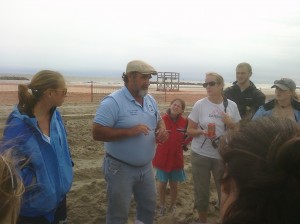You rarely meet a more natural & charismatic storyteller than Chris Hernandez (second from the left below). He puts his full self behind his narratives, whether he’s spinning harrowing stories about the devastation Katrina caused on Grand Isle or voicing his frustration about the chaos early on in the Deepwater Horizons spill summertime. 
By calling him a storyteller and thinking about his stories as performances, I don’t at all mean that they aren’t true, or reliable, or meaningful. Just the opposite — it’s in listening to a powerful narrator like Chris that the real facts of a catastrophe can communicate themselves across the gap of lived experience.
But Chris’s palpable authenticity doesn’t exempt him from what we literary types calls the laws of genre, and I found I thought a lot about literary form while listening to Chris describe his experiences of hurricanes and the oil spill. I thought Chris had two different kinds of stories to tell. Both were tragic, but they weren’t like each other. That difference might pose a problem.
The first kind of story, the hurricane story, was familiar & even cyclical. A “natural” disaster, if you will. It was the sort of thing that’s been happening on Grand Isle as long as recorded history, or longer. The storms comes, washes over the island at horrific cost — Chris’s rendition of walking past his own home in the dark after Katrina to find that his father-in-law’s house had disappeared was powerfully moving — but the storm passes, and the community rebuilds. It’s a narrative that moves fairly quickly, along familiar routes, from tragedy to salvage to recovery. That’s no consolation, perhaps, for those who lose homes or boats or loved ones, but it’s a story that Grand Islers know how to tell. 
The oil spill disaster was very unlike that story. It happened in slow motion, in broad daylight, with more plumes of oil perhaps still lurking to wash up on the beach. Its toxic remnants are still there, under the sand, 3 feet down. (We brought a shovel and checked.) The post-spill salvage operation brought several hundred BP-hired workers down to this (literally) insular community, introducing new human chaos to the summer season. No one really knows that long-term consequences of such a spill, though other large spills, such as the Ixtapa spill in the Gulf near the Mexican coast in 1979 or the Exxon Valdez in 1989, suggest a long horizon. There’s still lots of oil in both those places today.
What I heard from Chris’s narration of these two different stories, the familiar tragedy of Katrina and the unknowable disaster of the oil spill, was a master storyteller trying, with all the resources at his command, to assimilate the unknown story into the known. To believe that the long history of cultural and environmental resilience that has defined the human history of Grand Isle can process this disaster as it has so many others. To borrow the phrasing of Bruce Barcott in the great National Geographic article on the spill, he told the story “As if speaking the words would propel them toward truth.”
I hope he’s right. I think he’s right. But I can’t help worrying that oil is a very different kind of thing.
I really admire your comments on the power of storytelling, the part of this post that I was most moved by (as I am quite unfamiliar with the topic of environmental science, natural disaster, etc.). I agree that a powerful storyteller conveys the real facts to us in a moving manner and indeed “assimilates the unknown facts into the known” as you would say it. It is also interesting that you mentioned the laws of genre. Were there particular literary theorists or critics that you were influenced by regarding your comments on storytelling and the laws of genre?
I think that your points on storytelling would make an interesting discussion for our current topic of focus in this past week and the upcoming week, the profession of creative writing. Maybe we can relate these points in our next class!
However, in some parts of your post, I am trying to determine whether you believe that Chris was being truthful or not. Your attitude towards him seems kind of mixed. That is just one doubt that I had. Your emphasis on the storytelling aspect does bring to mind the question of whether you believe the stories as truth (although you seem to state earlier on that your attribute of him as a storyteller means the opposite).
I think Chris’s stories were entirely truthful & also that they follow what Derrida calls the “law of genre.” Narrative forms are ways of getting closer to human truths, not farther from them.